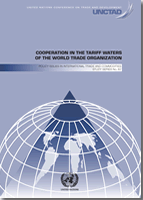
It has been long recognized that in the presence of market power, positive import tariffs can be optimal. The rationale is that higher tariffs reduce import demand, which in the presence of inelastic export supply from the rest of the world allows the importing country to increase its terms of trade. Indeed, there is empirical evidence suggesting that countries often set tariffs to exploit their market power when they have policy space to do so. However, optimal tariff-setting often results in a negative externality for trading partners.
Such externalities create incentives for trading partners to cooperate within a negotiating framework such as the World Trade Organization (WTO) or regional trade agreements. Indeed, there is large empirical evidence suggesting that WTO negotiations do facilitate cooperation in tariff-setting by providing a negotiating table to internalize terms-of-trade externalities.
This paper empirically explores whether any cooperative behaviour in tariff-setting extends beyond the WTO accession process. In principle, the possibility of further cooperation is provided by the presence of policy space in regard to tariffs within the WTO framework. Indeed, a key aspect of the WTO process is the negotiation of bound tariffs, rather than applied tariff levels.
WTO members can apply tariffs below the bound, if they choose to do so. The difference between the tariff that a country applies at the border and the country’s commitments to other WTO members is referred to as “tariff water”, or “binding overhang”. In principle, tariff waters provide the policy space for country to set their tariff at non-cooperative levels.
The findings of this paper suggest that countries do cooperate both during the accession process and beyond it. However, non-cooperative tariff-setting is observed in the presence of sufficiently large amounts of tariff water.
We find that in the absence of tariff water, importing countries’ market power tends to be negatively correlated with applied tariffs, which is consistent with a cooperative tariff-setting. On the other hand, in the presence of tariff water, the relationship between importers’ market power and tariffs tends to become positive, suggesting a tendency towards non-cooperative tariffs. However, the positive correlation between importers’ market power and tariffs is only observed when levels of tariff water are above 20 percentage points.
In the presence of moderate levels of tariff water, WTO members tend to set their tariffs cooperatively. One possible explanation for setting tariffs at non-optimal levels in the absence of legal constraints is the fear of retaliation from trading partners. We show that WTO members that have little to lose from retaliation tend to set tariffs non-cooperatively within their tariff waters, while WTO members that may have more to lose in case of retaliation are more likely to set tariffs cooperatively within their tariff waters.



